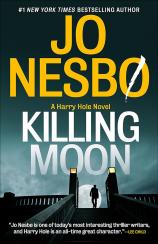Killing Moon: A Harry Hole Novel
Review
Killing Moon: A Harry Hole Novel
After 12 bestselling books, I thought maybe Jo Nesbø was weary of Harry Hole. The last title featuring this renegade Norwegian police inspector came out in 2019, and I was longing for a thriller with comparable audacity and edge. Now, with KILLING MOON, Harry is back. Part rock star, part melancholic philosopher, he is the coolest, smartest, most complex, least orthodox crime fighter around.
Yet Harry himself does seem weary in the first pages of the new novel, eking out a barren existence in Southern California after fleeing “a life in ruins” back home in the city he loves, Oslo. His wife, Rakel, has been murdered; a colleague is dead from suicide. It doesn’t feel as if there is much reason to go back or, for that matter, to live. Even if you’re accustomed to fictional cops who are brilliant but deeply flawed, Harry hits new highs --- or lows --- in this chilling example of Nordic Noir.
He is galvanized into something resembling his old self by one Lucille, an aging actress he encounters in a seedy LA bar. At 72, she has seen glory days --- playing Juliet in a film, hanging with famous musicians in 1960s Laurel Canyon --- but now she is in a bind. She borrowed money from the wrong people, and she asks Harry to help her escape some unsavory debt collectors. She expects nothing more than threats; instead, they try to grab her. Harry intervenes, and suddenly he and Lucille are on the run.
"In plotting this book, Nesbø gives us a heap of misleading clues, mistaken arrests, red herrings and blind alleys. He is a master of misdirection."
They bond platonically, strangely comfortable with one another. She buys him a fancy suit and shoes and gets him a good haircut; he keeps watch. Harry hasn’t quite regained his sharpness, though; he is struggling with lifelong alcoholism, trying a drink-limiting strategy called “Moderation Management,” while supplementing the booze with pot. It doesn’t work very well.
Then the bad guys catch up with them, demanding the money, $960,000, and taking Lucille hostage. Harry asks for that exact amount as payment for a murder case in Norway. Unless he finds the culprit and secures the cash in 10 days, Lucille will die.
Here’s where the LA plot line converges with a crime scene in Oslo. One woman’s body has been found, another woman is missing, and the police --- led by Katrine Bratt, head of the Crime Squad and a friend of Harry --- suspect the murder and the disappearance are linked. They do have a Person of Interest, a property mogul, Markus Røed, who knew both victims. It is he and his lawyer who hire Harry to clear Røed through an independent investigation.
For Harry, the pressure is on, emotionally and professionally. Returning home means confronting his losses as well as revisiting his extremely complicated history with Katrine. She and Harry had a brief sexual encounter. When her husband, Bjørn Holm, a forensics officer for the police, found out that Harry was the biological father of their son, he went mad, killing Harry’s wife, then himself. Now Harry gets to know three-year-old Gert for the first time, and you see this scarred, hardened man softening, even though his relationship with Katrine is history. She is more interested in his assistance than in romance, especially when they find a second and third body, suggesting a possible serial killer. Unofficially, she and Harry join forces.
Moving quickly, Harry assembles a ragtag “team” for his investigation. Foremost is psychologist Ståle Aune, his longtime collaborator; tragically, he is dying of cancer, so the HQ becomes his hospital room. It also includes Truls Berntsen, a perennially bent cop, currently suspended, who has access to police records, and Harry’s friend Øystein Eikeland, a cab driver/coke dealer/music enthusiast. There is a lot of entertaining, nerdish music banter in this book, as in previous Hole mysteries, partly, I assume, because Nesbø himself has been a vocalist and songwriter for a rock band (sample quote: “After listening to ‘Hallelujah,’” Øystein says, “I think I might have underrated Leonard Cohen. And overrated Bob Dylan”).
A little lightness is welcome, because there are a lot of noxious details in KILLING MOON. Factual grounding is always important in a police procedural, for the sake of authenticity. But while some of these are fascinating (the history of lie-detector tests, for example, or why a total lunar eclipse is called the “blood moon”), others, having to do with the life cycle of maggots and the uses of parasites, are stomach-turning. Do not read after a full meal!
Parasites are the key to the murderer’s system and philosophy. Since the narration alternates among several points of view, including the killer’s, we know his history, motivation and methods before either the police or Harry. In my opinion, a successful serial-killer novel (I confess, I love the genre, from SILENCE OF THE LAMBS to the Dexter series to the 2023 Edgar Award winner, NOTES ON AN EXECUTION) depends on the cleverness and psychological profile of the villain. This guy, Prim, isn’t quite Hannibal Lecter, but he is interestingly twisted.
Harry, of course, has dealt with serial killers before --- in THE SNOWMAN and THE LEOPARD, among others --- and regards investigating them as “not a sprint but a marathon” (this book, clocking in at almost 500 pages, proves the point). He is so knowledgeable that Katrine brings him in to address the Crime Squad on the subject. His rather erudite talk, citing lurid elements of the Jeffrey Dahmer case, ends with the prediction that the murderer will “strike again.” He’s right.
You’ll never guess who or when, though. In plotting this book, Nesbø gives us a heap of misleading clues, mistaken arrests, red herrings and blind alleys. He is a master of misdirection.
At the end of KILLER MOON, there is resolution for the case, but Harry is never entirely satisfied. He remains grief-stricken, driven, obsessive, a sort of Norwegian Hamlet. As his psychologist friend, Aune, puts it, “I suppose he’s seeking order. An answer. The need for that is often more keenly felt when everything else in your life is chaotic and seems to lack meaning.”
That’s Harry in a nutshell: a tortured, restless, devastatingly attractive antihero. Will he ever stop running? Will his little son give him reason to go on living? And does a cryptic paragraph at the very end of this book suggest that another serial killer is at large --- and a 14th Harry Hole mystery is in the offing?
Reviewed by Katherine B. Weissman on June 2, 2023




